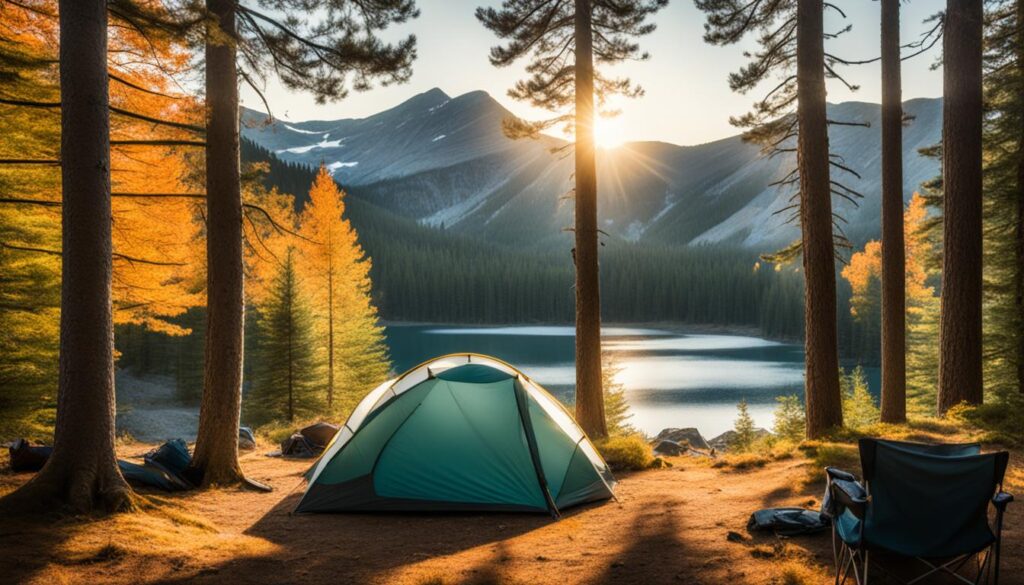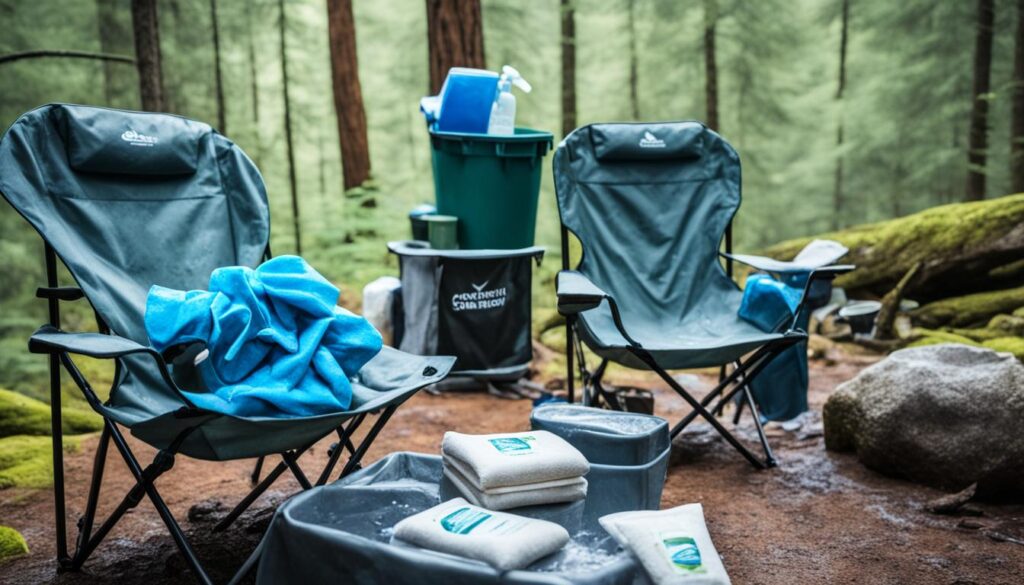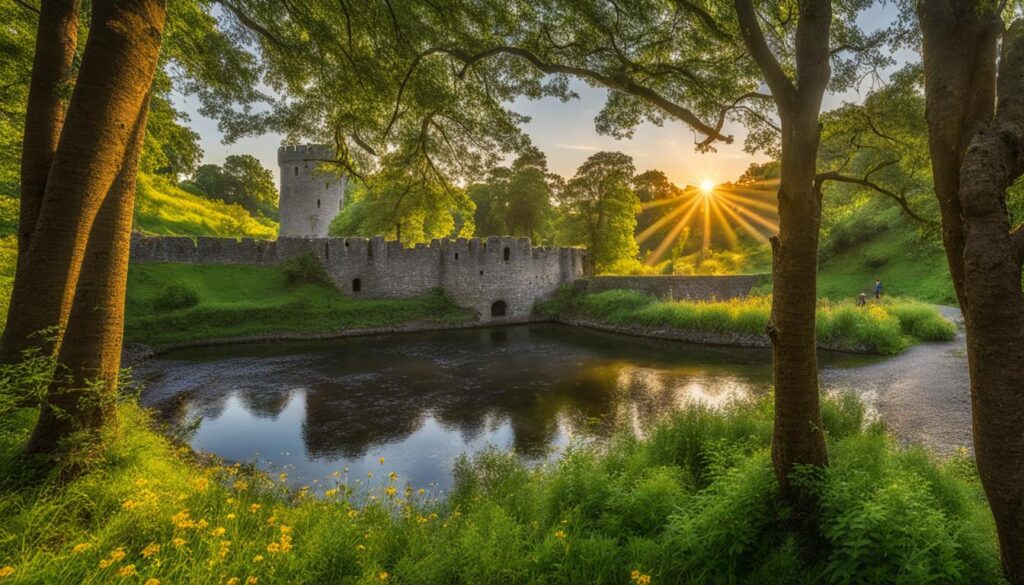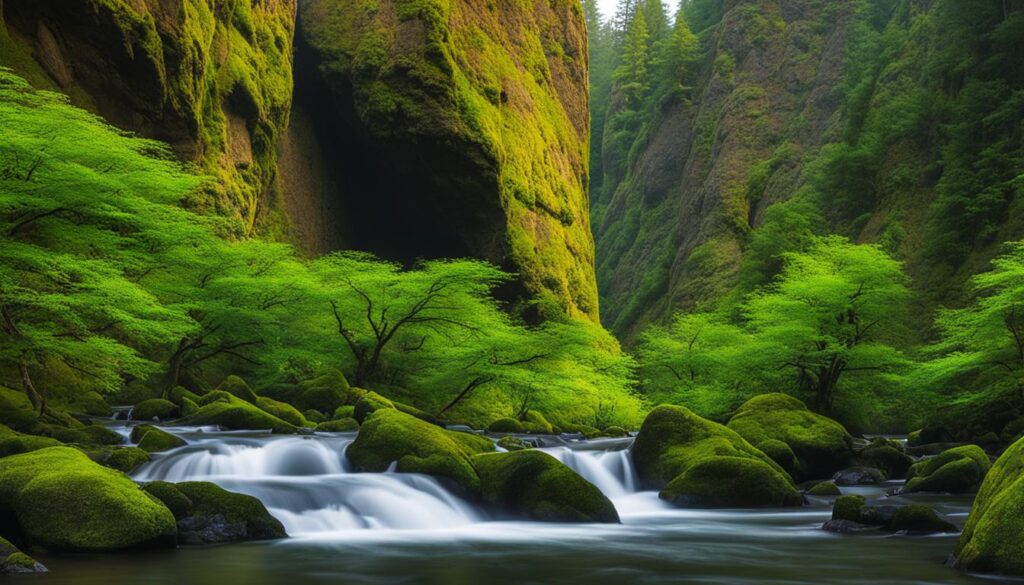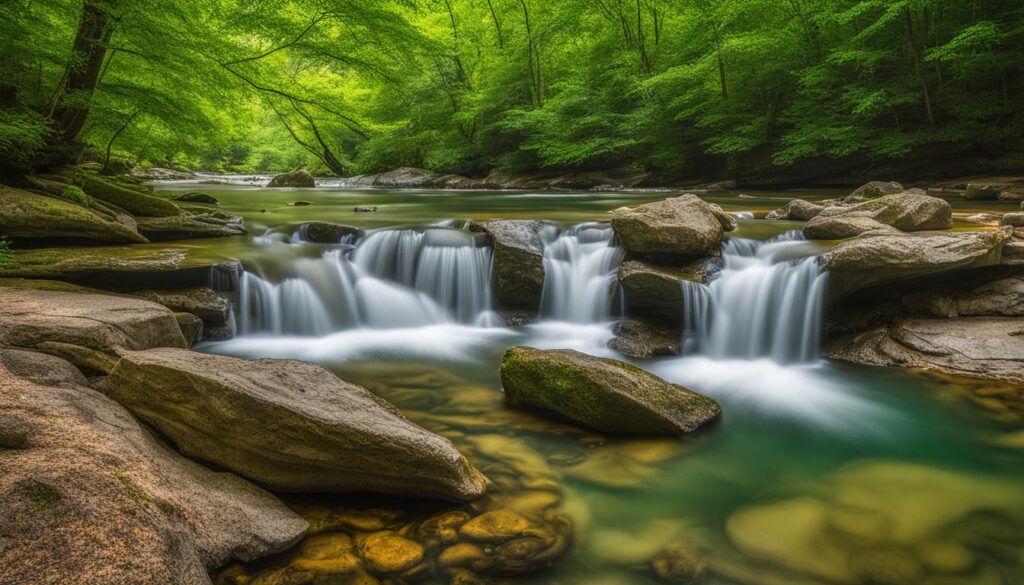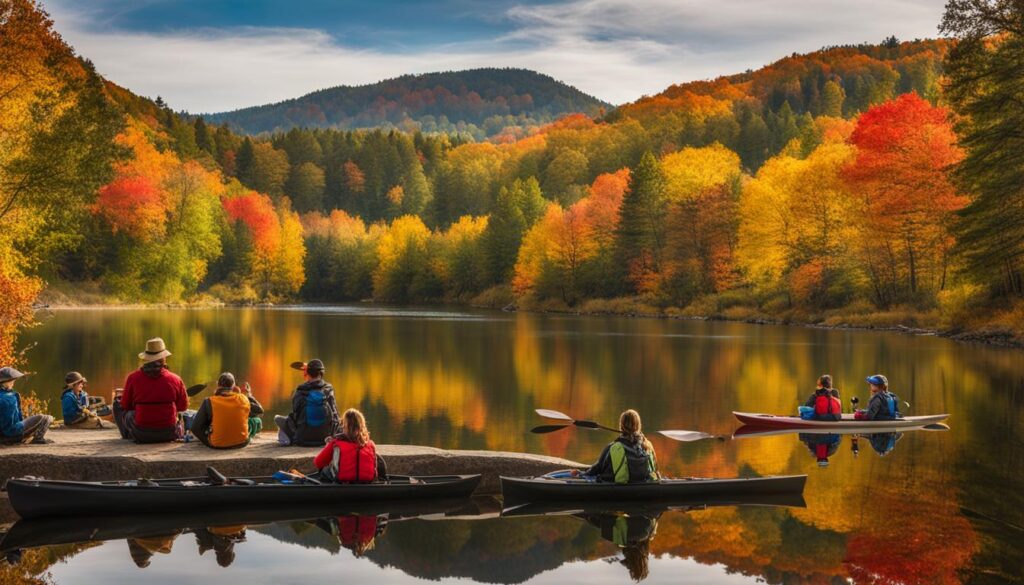As camping enthusiasts, understanding the timing and duration of the camping season is essential for planning our outdoor adventures. The camping season end date, also known as the camping season closure, varies depending on the location and park regulations. Knowing when to wrap up our camping trips allows us to make the most of the remaining time and ensure a smooth transition into the off-season.
In Michigan, for example, state park campgrounds typically close for the season in September, usually around the 15th. However, it’s important to note that each campground may have specific closure dates that deviate from the general timeline. To get accurate and up-to-date information on the camping season duration for a particular park, it’s advisable to check the park’s website or contact the park office directly.
Other campgrounds, such as Groveland Oaks Campground, may have their distinct camping season schedules, which might differ from state parks. For a seamless camping experience, it’s crucial to gather specific information for each campground you plan to visit, including their closure dates and any additional regulations.
Key Takeaways:
- The camping season closure varies depending on the location and park regulations.
- Michigan state park campgrounds typically close in September, around the 15th.
- Each campground may have specific closure dates, so it’s crucial to check the park’s website or contact the park office for accurate information.
- Other campgrounds, like Groveland Oaks Campground, may have their own unique camping season schedules.
- Understanding the camping season duration for different campgrounds is vital for planning your outdoor adventures.
When camping at state parks, it’s essential to adhere to the established rules and regulations. To ensure a safe and enjoyable experience for everyone, it’s important to familiarize yourself with the camping rules and regulations in place. Here’s a breakdown of key regulations you need to know:
- Park Hours: State parks typically operate from 8 a.m. to 10 p.m. During these hours, you can enjoy various recreational activities and amenities. However, it’s important to note that after 10 p.m., only registered campers are allowed in the park.
- Recreational Passport: When visiting a state park, you’ll need to have a valid Recreation Passport for your vehicle. This allows entry into state parks and recreation areas. Ensure you have a valid passport before planning your camping trip.
- Alcohol Restrictions: While many state parks allow alcohol, some may have restrictions on alcohol possession and use. It’s important to familiarize yourself with the specific rules at the park you plan to visit. Always drink responsibly and follow any guidelines provided.
- Pet Regulations: State parks generally welcome pets, but there are regulations to ensure their safety and the cleanliness of the park. Pets are usually required to be on a 6-foot leash at all times, and owners must properly dispose of their waste. Be considerate of other campers and wildlife when bringing your furry companions.
- Fishing License and Hunting Regulations: If you’re planning to engage in fishing or hunting activities during your camping trip, be aware that fishing licenses and hunting regulations can vary by park. Make sure you have the necessary licenses and permits before participating in these activities. Respect any catch limits and follow all hunting regulations to preserve the park’s natural resources.
- Event Permits: If you’re planning to host an event or engage in commercial activities, such as photography sessions or outdoor classes, you may need to obtain an event permit in advance. Check with the park authorities for any specific requirements and regulations concerning event permits.
Overall, complying with these regulations will ensure a pleasant experience for yourself, fellow campers, and the preservation of the state park’s natural beauty. Remember to always follow the rules, be respectful of others, and enjoy your camping adventure responsibly.
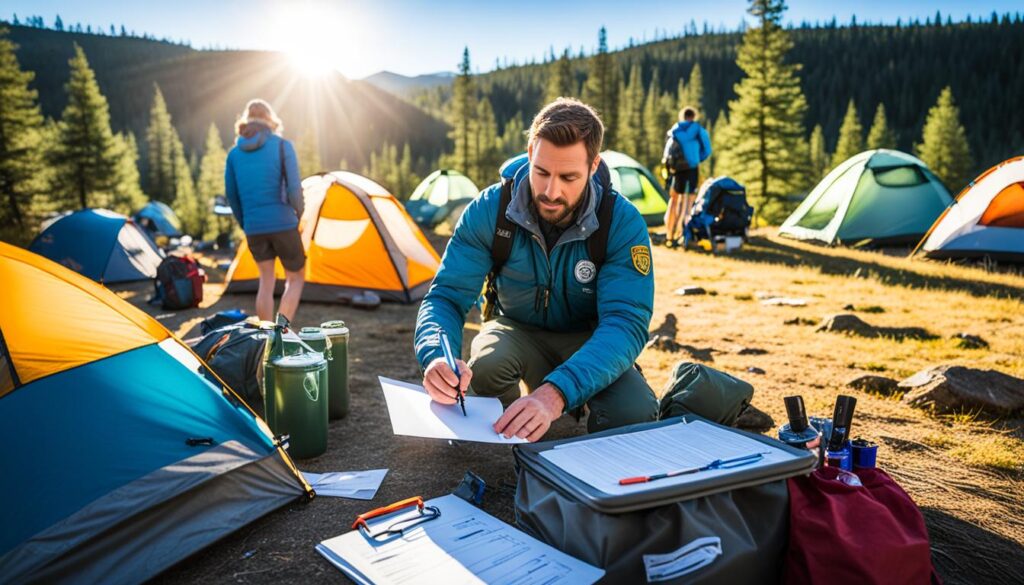
Penalties for Violating Camping Rules
It’s important to note that violating camping rules and regulations can result in penalties and potential legal consequences. State parks have strict enforcement when it comes to maintaining order and protecting the park’s natural resources. The penalties for rule violations can include fines, eviction from the park, and even legal actions depending on the severity of the violation.
To ensure a positive camping experience and avoid any negative consequences, familiarize yourself with the specific rules and regulations of the state park you plan to visit. Be respectful of the park’s guidelines and enjoy all the beauty and recreational opportunities it has to offer.
| Violation | Penalty |
|---|---|
| Camping without a valid permit | Fine up to $500 and possible eviction |
| Alcohol possession and use in restricted areas | Fine up to $250 and possible eviction |
| Failure to leash pets or clean up after them | Fine up to $100 and possible eviction |
| Illegal fishing or hunting activities | Fine up to $1,000, possible eviction, and legal consequences |
| Hosting an event or engaging in commercial activities without a permit | Fine up to $1,500, possible eviction, and legal consequences |
Specific Campground Closure Dates
When planning your camping trips, it’s essential to stay informed about specific campground closure dates. While state park campgrounds typically close for the season in September, some campgrounds, like Groveland Oaks Campground in Michigan, may have their own distinct closure dates.
Groveland Oaks Campground Closure: Groveland Oaks Campground usually closes for the season in early spring. The exact closure dates can vary, so it’s important to check the campground’s website or contact their office directly for the most up-to-date information.
Planning ahead for your visit is crucial, especially during peak times like holidays and weekends. To secure your spot, make advance reservations, which can usually be made up to 11 months in advance. Keep in mind that reservations often require full payment at the time of booking.
Reservation Information
When making a reservation, it’s recommended to familiarize yourself with the campground’s reservation policies. Here are some general guidelines:
- Reservations can typically be made online or by contacting the campground office directly.
- Full payment is usually required at the time of booking.
- Reservations can often be made up to 11 months in advance.
- Specific campsites may be available for reservation, depending on the campground’s policies.
Cancellation Policies
Campground cancellation policies vary, and it’s important to understand the refund options and timing associated with cancellations. Here are some common cancellation policies:
- Cancellations made within a certain timeframe may be eligible for a full or partial refund.
- Some campgrounds may require a minimum notice period for cancellations to qualify for a refund.
- Refunds may be issued in the form of a campground credit or returned to the original payment method.
- It’s advisable to review the specific cancellation policy of the campground you plan to visit.
Office Hours
When inquiring about reservation information, campground closures, or any other inquiries, it’s essential to be aware of the campground’s office hours. Most campgrounds have designated office hours when staff are available to assist you. Here are some general office hour guidelines:
| Day | Office Hours |
|---|---|
| Monday – Friday | 9:00 AM – 5:00 PM |
| Saturday | 10:00 AM – 3:00 PM |
| Sunday | Closed |
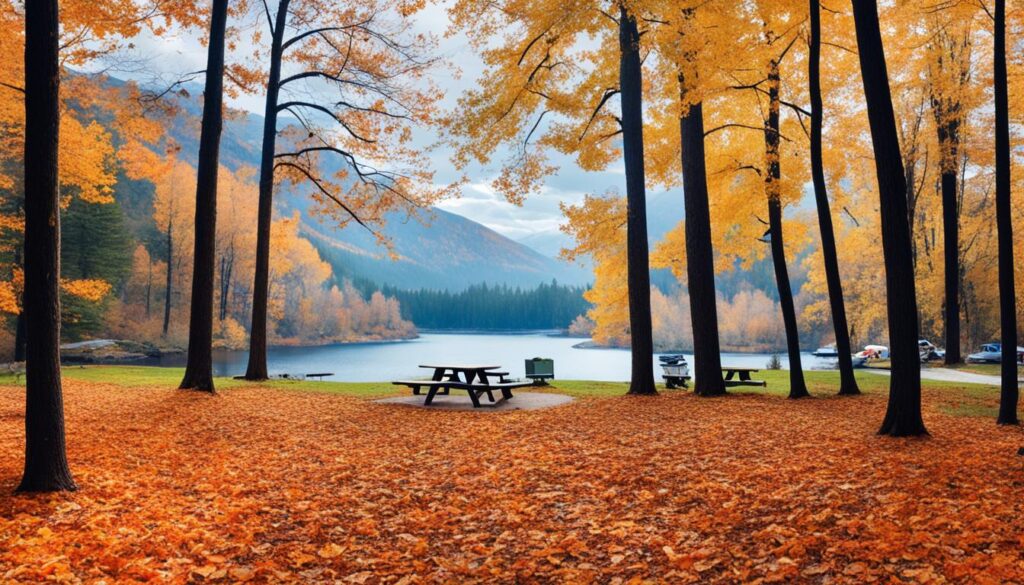
Camping Options on BLM-Managed Lands
When it comes to camping, the Bureau of Land Management (BLM) offers a variety of options on their managed lands. Whether you prefer developed campgrounds or dispersed camping, there are opportunities for every camper to enjoy the great outdoors.
Developed Campgrounds
If you’re looking for a camping experience with convenient facilities, developed campgrounds on BLM-managed lands are a great choice. These campgrounds provide amenities such as restrooms, water sources, picnic areas, and even electrical hookups for added convenience. Some developed campgrounds may require reservations and camping fees, while others operate on a first-come, first-served basis. It’s recommended to check with the specific campground or the local BLM office for reservation information and any camping limitations.
Dispersed Camping
If you prefer a more secluded and off-the-grid camping experience, dispersed camping is permitted on BLM-managed lands. Dispersed camping allows campers to set up camp away from developed facilities, providing a true wilderness experience. However, it’s important to note that dispersed camping has its own set of rules and limitations. Typically, campers can stay for a maximum of 14 days within a 28-day period. It’s crucial to check with the local BLM office for specific regulations, permit requirements, and any additional restrictions that may apply.
In addition to the camping options, it’s worth mentioning that BLM-managed lands often boast breathtaking natural landscapes, including mountains, deserts, and national scenic trails. These lands offer opportunities for hiking, fishing, wildlife viewing, and other outdoor activities, making them a haven for nature enthusiasts.
So whether you’re seeking the convenience of developed campgrounds or the freedom of dispersed camping, BLM-managed lands provide a range of camping options to suit your preferences. Just be sure to familiarize yourself with the camping permits, limitations, and any specific regulations before embarking on your adventure.
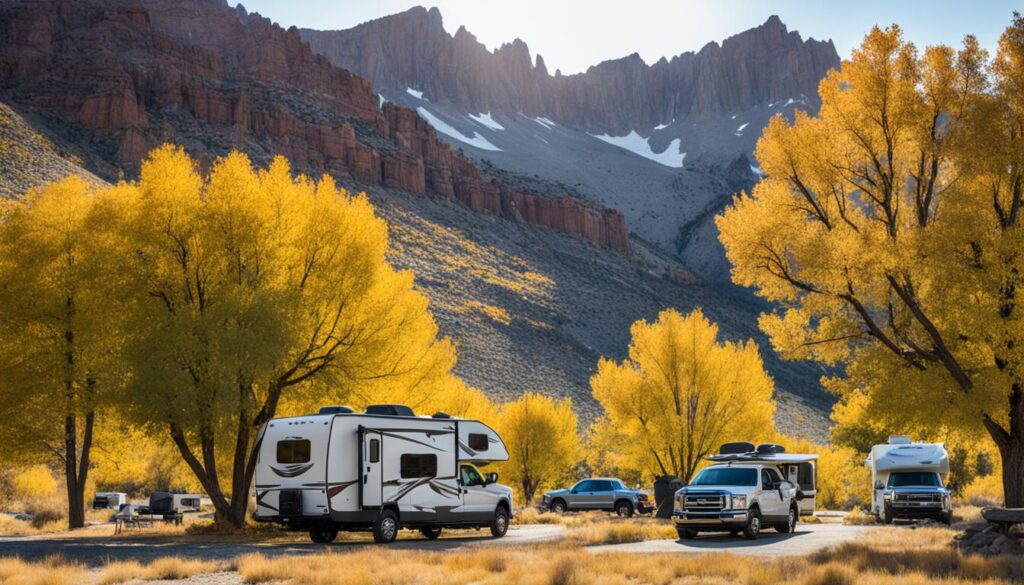
Campsite Selection and Regulations
When it comes to choosing a campsite, there are important guidelines and regulations to follow. Whether you’re considering dispersed camping or staying at a campground, understanding the rules will ensure a smooth and enjoyable experience.
Dispersed Camping
Dispersed camping offers a more secluded and rustic experience, allowing you to set up camp in non-designated areas. These sites are typically found along secondary roads and may have traces of previous campers. It’s best to choose an existing site to minimize environmental impact and avoid creating new disturbances.
Campground Regulations
Both developed and dispersed campgrounds have specific regulations that campers need to be aware of. These regulations cover various aspects such as fees, duration limits, and refuse disposal.
Campsite Fees:
When staying at a campground, campsite fees vary depending on the location and amenities provided. Fees may be charged per night or per site, and payment is typically required upon occupying a site. Make sure to inquire about the fee structure when making reservations or upon arrival.
Duration Limits:
Most campgrounds have duration limits to ensure fair access to all campers. These limits typically range from a few days to two weeks within a month period. However, it’s important to verify the specific duration limits with the campground or the Bureau of Land Management (BLM) office for dispersed camping sites.
Refuse Disposal:
Proper disposal of refuse, sewage, and hazardous materials is essential to preserve the environment and maintain cleanliness. Campgrounds usually provide designated trash receptacles and dump stations. It’s important to follow the campground’s guidelines and dispose of waste responsibly.
Campground Regulations Comparison
| Developed Campgrounds | Dispersed Camping | |
|---|---|---|
| Fees | Varies depending on location and amenities. | Generally no fees, but some areas may require permits. |
| Duration Limits | Usually around two weeks within a month period. | Varies by location. Check with the campground or BLM office. |
| Refuse Disposal | Designated trash receptacles and dump stations provided. | Campers must pack out all trash and dispose of it properly. |
Remember, respecting the regulations is crucial for preserving the natural beauty of the camping areas and ensuring a positive experience for all campers.
By following these campsite selection and regulations, you’ll be able to fully enjoy your camping adventure while taking care of the environment.
Additional Camping Considerations
Before embarking on a camping trip, I encourage you to consider some important additional factors that can enhance your overall experience. These considerations ensure your safety, promote environmental preservation, and contribute to a peaceful camping environment for all.
Campground Availability and Adverse Weather Closures
Checking campground availability is crucial before your trip. Adverse weather conditions can lead to temporary closures, affecting your camping plans. Ensure you stay informed about any campground closures due to inclement weather, such as storms, severe flooding, or wildfires. It’s advisable to contact the campground office or check their website for real-time updates on weather-related closures. This will help you plan your trip accordingly and avoid any unexpected changes upon arrival.
Generator Usage and Quiet Hours
If you plan on using a generator during your camping adventure, it’s essential to be mindful of the campground’s quiet hours and noise regulations. Generators can be noisy and disruptive to other campers seeking tranquility. Adhering to quiet hours, typically during the late evening and early morning, ensures everyone can enjoy a peaceful camping experience. Be considerate of your fellow campers and limit generator usage during these designated quiet hours.
Cultural Site Preservation
Preservation of cultural sites is paramount in maintaining the historical significance and integrity of our natural surroundings. While exploring camping areas that may have cultural sites, such as petroglyphs or artifacts, it’s crucial to remember that these sites are protected. Touching petroglyphs or removing artifacts can cause irreversible damage and is strictly prohibited. By respecting cultural site preservation, you contribute to the conservation of our shared heritage and ensure future generations can appreciate these valuable historical treasures.
Reporting Crimes and Suspicious Activity
While camping, it’s essential to prioritize safety. If you witness any criminal activity or observe suspicious behavior within the campground, it is your responsibility to report it immediately to the appropriate authorities. This helps maintain a secure environment for all campers and ensures the well-being of everyone on site. Remember, reporting crimes is not only a personal responsibility but also a collective effort to create a safe camping community.
By acknowledging and considering these additional camping considerations, you can have a safe, enjoyable, and memorable camping experience. It’s crucial to be aware of campground availability, adhere to quiet hours and generator regulations, respect cultural sites, and promptly report any suspicious activity. These simple actions contribute to a harmonious camping environment and the preservation of our natural and cultural heritage.
Plan Your Camping Adventures Wisely
When it comes to planning your camping trips, there are several factors that should be taken into consideration to ensure a smooth and enjoyable outdoor adventure. One important aspect is understanding the camping season schedule. By knowing when camping seasons end and the specific closure dates for campgrounds, you can plan your trips accordingly and avoid any disappointments or inconveniences.
Whether you prefer state park campgrounds or BLM-managed lands, it’s crucial to familiarize yourself with the rules and regulations in place. Take the time to understand the camping restrictions, such as the maximum stay limits, quiet hours, and proper refuse disposal methods. This knowledge will not only help you have a successful camping experience but also contribute to the preservation and protection of these natural spaces.
In addition to understanding the camping regulations, it’s advisable to make reservations in advance. This is especially important during peak seasons or for popular campgrounds. By securing your spot ahead of time, you can guarantee your place in the campground and avoid any last-minute disappointment. Many campgrounds allow reservations to be made up to several months in advance, so be sure to take advantage of this option.
Lastly, to ensure you make the most out of your camping season, take advantage of the resources available to you. Consult park websites, campground brochures, and camping forums to gather useful information about available amenities, nearby hiking trails, and recommended attractions. This will help you plan your activities effectively and make the most of your time in the great outdoors. By planning your camping adventures wisely, you can create unforgettable memories and enjoy the beauty of nature to its fullest.
FAQ
When does camping season end?
Camping season end dates vary depending on the location and park regulations. It’s important to check the specific closure dates for each campground you plan to visit. State park campgrounds in Michigan typically close for the season in September, around the 15th.
What are the camping rules at state parks?
Park hours generally range from 8 a.m. to 10 p.m., and only registered campers are allowed in the park after 10 p.m. A Recreation Passport is required for vehicle entry into state parks and recreation areas. Other rules may include restrictions on alcohol possession and use, pet regulations, fishing and hunting rules, and permits for events or commercial use. Research activities may require a use permit.
Are there specific closure dates for Groveland Oaks Campground?
Groveland Oaks Campground in Michigan typically closes for the season and reopens in early spring. For specific closure dates, it’s recommended to visit the campground’s website or contact their office directly.
What are the camping options on BLM-managed lands?
The Bureau of Land Management (BLM) offers developed campgrounds with facilities and dispersed camping, which allows camping away from developed areas. Some campgrounds require fees and reservations, while others operate on a first-come, first-serve basis. Dispersed camping usually has maximum stay limits and specific rules varying by location. Contact the local BLM office for more details.
What are the regulations for campsite selection?
When choosing a campsite, it’s important to use existing sites to minimize impact. Campgrounds have regulations regarding fees, stay limits, and refuse disposal. Fees are typically required upon occupying a site, and stay limits are usually around two weeks within a month period. Proper disposal of refuse, sewage, and hazardous materials is crucial for environmental preservation.
What additional considerations should I keep in mind while camping?
Adverse weather conditions can affect campground availability, leading to temporary closures. Quiet hours should be observed when using generators to ensure a peaceful experience for all campers. Cultural sites should be preserved, and touching petroglyphs or removing artifacts is prohibited. Any suspicious or criminal activity should be reported to the appropriate authorities.
How can I plan my camping adventures wisely?
To plan your camping trips wisely, it’s important to consider camping season schedules, specific campground closure dates, and reservation availability. Use the resources available to you, such as websites and campground offices, to gather information and make advance reservations. By staying informed and organized, you can make the most out of the camping season.
